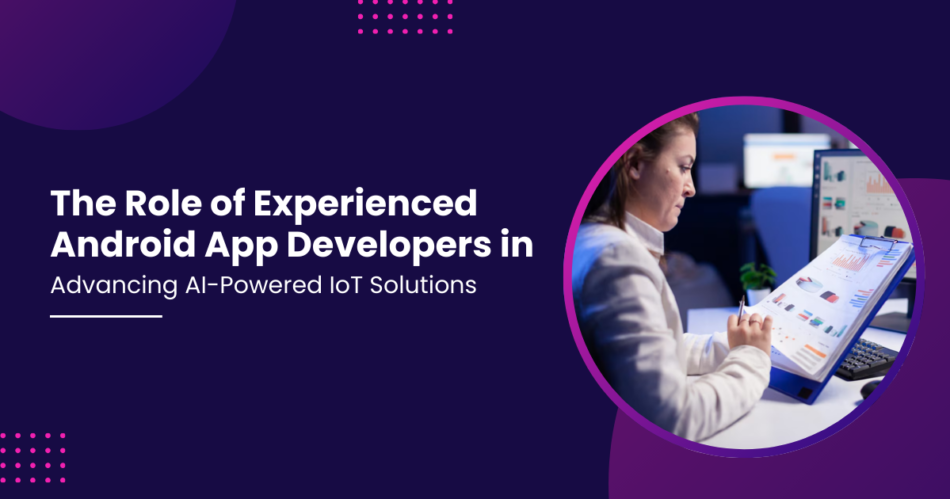The rapid advancement of technology has ushered in an era where Artificial Intelligence (AI) and the Internet of Things (IoT) are at the forefront of innovation. According to Statista, the IoT market size is projected to surpass $1.1 trillion by 2026, while AI is expected to contribute $15.7 trillion to the global economy by 2030 (PwC). These technologies work in tandem to create solutions that are smarter, more efficient, and capable of automating complex processes. Furthermore, 86% of IoT professionals believe that AI is critical to IoT’s success (IoT Analytics Report).
The driving force behind many of these breakthroughs is skilled Android app developers, whose expertise enables the seamless integration of IoT and AI. Research shows that 60% of IoT devices run on Android-powered systems, making Android developers vital for IoT innovation (Gartner). Additionally, businesses that invest in experienced developers report a 35% faster project delivery rate and improved system performance.
What Are AI-Powered IoT Solutions?
AI-powered IoT solutions refer to the combination of IoT devices that collect and transmit data with AI systems capable of analyzing and processing that data in real time. These solutions aim to make devices intelligent and autonomous, leading to smarter systems that enhance user experiences.
For example:
- Smart Cities: IoT sensors monitor traffic, while AI algorithms optimize traffic flow.
- Predictive Maintenance: Industrial IoT devices predict equipment failures before they occur.
- Healthcare Innovations: Wearable IoT devices track patient health, and AI algorithms detect anomalies.
The ability of these solutions to learn, adapt, and respond dynamically to changes is transforming industries across the globe.
Why Is Android a Key Platform for IoT?
Android has emerged as a preferred platform for IoT app development due to several advantages. Let’s examine why:
1. Massive Market Share
Android dominates the mobile operating system market, with a global share exceeding 70%. This ubiquity ensures that Android-powered IoT solutions can reach a broad audience.
2. Open-Source Flexibility
Android’s open-source nature allows developers to modify and customize the platform for specific IoT use cases. This is particularly beneficial in developing tailored solutions.
3. Cost Efficiency
Android app development is generally more cost-effective than proprietary platforms. Businesses can allocate resources to innovation without exceeding budgets.
4. Wide Hardware Compatibility
Android supports a vast range of devices, from smartphones and tablets to smart TVs and wearables, making it ideal for IoT ecosystems.
How Experienced Android Developers Drive AI-Powered IoT Innovation
Experienced Android developers bring unique skill sets and deep technical expertise to AI-powered IoT projects. When you hire Android developers, you gain access to professionals who can design scalable applications, integrate AI algorithms, and ensure seamless connectivity, making them invaluable for driving innovation in IoT solutions. Here are some key ways they contribute:
1. Developing Scalable Applications
As IoT ecosystems grow, scalability becomes a necessity. Developers design applications that can support increasing numbers of connected devices while maintaining optimal performance.
2. Implementing AI Algorithms
Integrating AI algorithms is critical for IoT functionality. For instance, a smart irrigation system might use AI to analyze weather patterns and schedule watering. Developers ensure these algorithms are embedded seamlessly into apps.
3. Ensuring Real-Time Communication
IoT solutions rely on constant communication between devices. Developers use protocols like MQTT, HTTP, and WebSockets to enable reliable real-time data exchange.
4. Enhancing Data Security
Security is a top concern in IoT, as devices are susceptible to cyber threats. Skilled developers implement robust encryption techniques and authentication protocols to protect user data.
5. Optimizing Energy Efficiency
Many IoT devices are battery-operated, necessitating energy-efficient applications. Developers optimize app performance to minimize power consumption.
Also Read : The Intersection of AI, IoT, and Grocery Delivery: Innovating for a Sustainable Future
Essential Skills of an Expert Android Developer for AI and IoT
Hiring the right talent is critical to the success of any project. Hire expert Android developers with the following skills to ensure your project’s success:
1. Mastery of Android Development
Proficiency in Java and Kotlin—the primary programming languages for Android—is essential. Developers must also understand Android SDK, APIs, and libraries.
2. Expertise in AI and Machine Learning
Knowledge of AI frameworks such as TensorFlow, PyTorch, or Google ML Kit is crucial for building intelligent IoT solutions.
3. Understanding IoT Protocols
Developers should be familiar with IoT-specific protocols like Zigbee, Bluetooth Low Energy (BLE), and LoRaWAN, which ensure seamless device communication.
4. UI/UX Design Knowledge
For IoT apps, usability is key. Developers must design interfaces that simplify complex functionalities, ensuring an intuitive user experience.
5. Problem-Solving Skills
Developers should possess strong analytical skills to troubleshoot challenges, from connectivity issues to data synchronization.
The Challenges in AI-Powered IoT Development
Building AI-powered IoT solutions comes with unique challenges. Experienced developers help businesses overcome these hurdles:
1. Handling Big Data
IoT devices generate massive amounts of data. Developers must design apps capable of processing, storing, and analyzing this data in real time.
2. Maintaining Security and Privacy
IoT devices often handle sensitive information, making them targets for cyberattacks. Developers implement security measures like two-factor authentication and end-to-end encryption to protect data.
3. Ensuring Interoperability
IoT ecosystems involve diverse devices from different manufacturers. Skilled developers ensure seamless integration and communication across these devices.
4. Managing Latency
AI-powered IoT applications require real-time data processing. Developers optimize applications to reduce latency, ensuring timely responses.
Real-World Applications of AI-Powered IoT Solutions
1. Smart Homes
IoT devices like smart thermostats, lighting systems, and security cameras use AI to automate daily tasks. For instance, a smart thermostat learns user preferences to optimize heating and cooling.
2. Healthcare
Wearable devices track vital signs, while AI analyzes the data for early detection of health issues. Developers create apps that visualize this data for users and healthcare providers.
3. Agriculture
IoT sensors monitor soil moisture, temperature, and weather, while AI determines the best times for planting or irrigation.
4. Industrial Automation
Manufacturing plants use IoT sensors for predictive maintenance, reducing downtime and costs. Developers design apps that provide actionable insights based on sensor data.
Benefits of Hiring Android Developers for IoT Projects
As businesses increasingly adopt AI-powered IoT solutions, the role of skilled Android developers becomes critical. Hiring expert Android developers ensures that your IoT projects are completed efficiently, effectively, and innovatively. Here’s an in-depth explanation of the benefits they bring:
1. Faster Time-to-Market
Experienced Android developers are familiar with the intricacies of IoT and AI-powered application development. Their expertise allows them to quickly adapt to project requirements and efficiently troubleshoot issues. By leveraging proven methodologies and tools, they reduce development time and ensure that applications are delivered on schedule. This speed is crucial in today’s competitive market, where early deployment can offer a significant advantage.
2. High-Quality Development
Skilled Android developers adhere to industry best practices, ensuring the delivery of robust and reliable applications. They focus on creating efficient code, integrating secure protocols, and ensuring seamless communication between IoT devices. High-quality applications minimize downtime, enhance user experience, and reduce long-term maintenance costs, making them a valuable asset to businesses.
3. Custom Solutions
Every business has unique requirements, and cookie-cutter solutions may not suffice. Experienced Android developers design custom IoT applications tailored to specific needs, ensuring a competitive edge. For instance, an agricultural IoT app might integrate weather data and soil analysis tailored for a particular region. These custom solutions align with business objectives, maximizing their effectiveness.
4. Cost Savings
Hiring expert Android developers can significantly reduce expenses. By outsourcing development to skilled professionals, businesses avoid the costs of in-house training, infrastructure, and trial-and-error development. Additionally, high-quality applications reduce operational inefficiencies, leading to long-term savings. Businesses gain access to top talent without incurring the overhead associated with maintaining an internal team.
5. Access to Latest Technologies
The tech landscape evolves rapidly, and experienced developers stay updated on the latest advancements. They bring expertise in cutting-edge technologies, such as AI frameworks, IoT protocols, and cloud integration. This ensures that your IoT applications incorporate modern features, enhancing their functionality and future-proofing them against emerging trends.
Industry Statistics Supporting IoT Growth
The potential of IoT is evident from the rapid growth of the industry, supported by key statistics that highlight its scope and impact:
- IoT Market Size: By 2026, the IoT market is projected to exceed $1.1 trillion (Statista).
- Connected Devices: The number of IoT devices worldwide is expected to surpass 75 billion by 2025 (IoT Analytics).
- Cost Reduction: AI-powered IoT solutions are estimated to reduce operational costs by up to 25% in various industries (Gartner).
These figures underline the massive opportunities available for businesses investing in IoT applications, making it essential to hire skilled developers to capitalize on this growth.
Read More: Why Global Companies Choose Quytech to Hire AI Developers in India
Steps to Hire the Right Android Developer for Your IoT Project
To ensure the success of your IoT project, it’s crucial to hire the right talent. Follow these steps to make informed hiring decisions:
1. Define Project Requirements
Start by clearly outlining the scope, goals, and technical requirements of your project. Include details such as the desired features, compatibility with specific IoT devices, and integration with AI algorithms. A well-defined project brief helps attract candidates with relevant expertise.
2. Assess Experience
Look for developers with a proven track record in IoT and AI-powered projects. Experienced developers understand the unique challenges of IoT, such as data synchronization, device interoperability, and real-time communication. Their prior experience ensures they can anticipate and address potential issues effectively.
3. Evaluate Technical Skills
Conduct technical assessments to test the candidate’s proficiency in essential programming languages like Java and Kotlin, as well as AI frameworks like TensorFlow and Google ML Kit. Additionally, evaluate their knowledge of IoT-specific protocols such as MQTT, BLE, and Zigbee, which are crucial for device communication.
4. Check Portfolio
Review the candidate’s portfolio to understand their expertise and creativity. Look for projects similar to your requirements, such as IoT apps for specific industries. Pay attention to user interfaces, app functionality, and feedback from previous clients or employers.
5. Conduct Technical Interviews
Technical interviews should include coding challenges and real-world problem-solving scenarios. For example, you might ask candidates how they would optimize an IoT app for real-time data processing or how they would secure communication between devices. These tests reveal the candidate’s problem-solving approach and ability to handle project-specific challenges.
Conclusion
The integration of AI and IoT is transforming industries by enabling smarter, more efficient solutions. However, the success of these projects relies heavily on the expertise of experienced Android app developers. From building scalable applications to ensuring data security, their contributions are invaluable.
Businesses looking to stay ahead in the competitive landscape must hire Android developers or hire expert Android developers who possess the technical skills and experience required for AI-powered IoT projects. By doing so, they can unlock the full potential of these groundbreaking technologies and achieve long-term success.
 WhatsApp Us Now
WhatsApp Us Now








